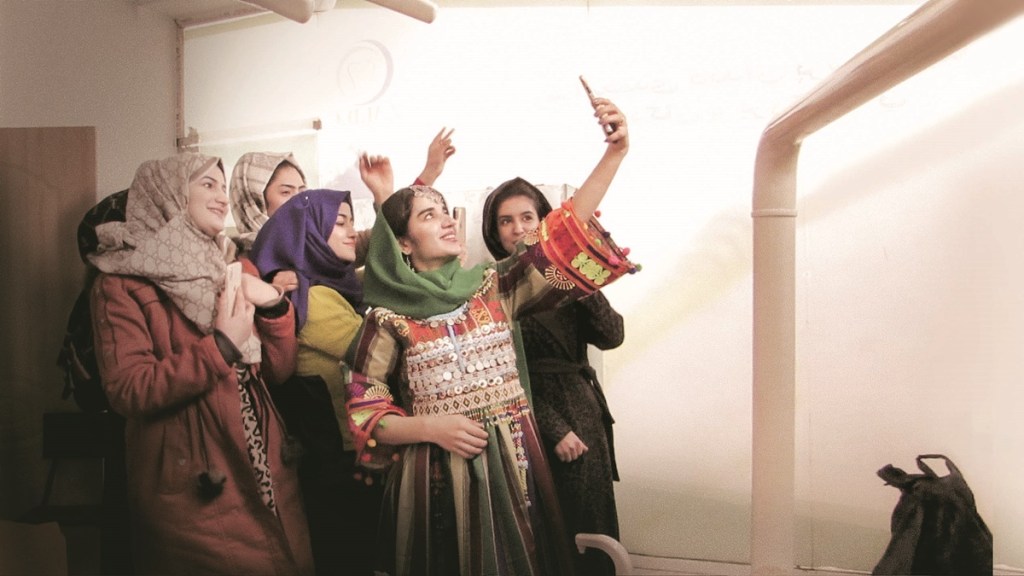Zahra Mohammadi was the happiest woman in Kabul on August 14, 2021. That evening, the young dentist celebrated her engagement to Omid, a software engineer, with her family and friends. Mohammadi’s world would come crashing down on her the next day when the Taliban took control of Kabul. She would no longer be able to work, like her fellow Afghan women banned from jobs, schools and colleges. Mohammadi, however, wasn’t going to spend her life indoors, instead deciding to form a resistance against the Taliban to demand the rights of women to work and study.
The fight for women’s rights in Afghanistan under the Taliban regime by thousands of women like Mohammadi is the focus of Bread and Roses, a new documentary that premiered at the Cannes film festival held during May 16-27. Directed by acclaimed Afghan filmmaker Sahra Mani, the film focuses on the protests and demonstrations by women by drawing heavily from video footage shot secretly and those filmed by women protesters themselves.
“There are so many women in Afghanistan, who are doctors and teachers and have the talent to contribute to the society, but are stopped from working,” Mani told FE at the Cannes festival. “I wanted to represent the modern and educated women in Afghan society after the collapse of the country and what the Taliban as a terrorist and totalitarian group did to the women and education system,” she says.
Part of the Cannes festival’s Special Screenings programme, Bread and Roses won huge applause from its international audience. “Please don’t forget Afghan women. Please don’t recognise the Taliban,” Mohammadi, who was present at the premiere, pleaded with the audience. Oscar-winning American actor Jennifer Lawrence, who has produced the film, flew into Cannes to support the film, its director and her main protagonist at the festival.
“I have been working for many years with a charity in Afghanistan on the situation of women in my country,” says Mani, whose previous documentary, A Thousand Girls Like Me, on violence against women in Afghan society, was part of the Hot Docs Canadian International Documentary Festival in Toronto in 2018. “When the Taliban took over the country they stopped women from going back to their jobs. Most of these women were breadwinners of their families. So, I started working with the charity to see how I could help these women,” says the filmmaker.
Mani soon started receiving videos sent by many Afghan women to her. “They knew that I am a filmmaker and I focus on social issues in Afghanistan. They expected me to represent the voice of Afghan women by showing the loss of their jobs and rights,” says Mani, who started documenting the videos. When the situation became tougher and many women protesters were killed or arrested, she decided to do something more than documenting the videos. “That is when I started searching and finding women protesters who were happy to be in a film. They also started filming themselves.”
It helped that Mani had already left Afghanistan and was in Europe where she could launch the production of a documentary on the life and struggle of Afghan women against inequalities and loss of jobs. “I had left Kabul a few weeks before the arrival of the Taliban on August 15, 2021, to pitch a new film project (Kabul Melody) at the Venice film festival. I left early because I thought the Kabul airport would be closed because of the Covid-19 pandemic and I would get stuck in the city. I was busy with that project while I started receiving all these videos after the fall of Kabul. I thought I would finish Kabul Melody. I never thought I would be doing another film.”
Also read: Sanya Malhotra: At the top of her game
Mani employed a cameraman and camera women in Kabul to film the protests secretly. Videos soon started arriving in her inbox, from her camera crew and those filmed by the women protesters themselves. Mani had already built an archive of footage of Kabul, a city she loves. “I love how Kabul is beautiful in the picture,” she says. The idea of a new documentary on the women’s struggle was taking shape when the team of Jennifer Lawrence reached out to Mani. “They (Lawrence’s team) had watched my previous film, A Thousand Girls Like Me, at the Hot Docs festival in Toronto in 2018. They liked it and wanted to do a film collaboration with me. I received an email from their production house saying they are interested in producing my new film on Afghanistan. Lawrence knows the situation in Afghanistan. She was very supportive during the production,” says Mani.
Bread and Roses shows burqa-clad women protesters with placards that say, We Want Work, Bread and Education and Misogyny is a Programme, Hijab is an Excuse. In some scenes, security forces are seen spraying water cannons on the women protesters and shooting in the air. Mohammadi was among many women arrested by police. She was released later. “The film won’t be able to show all the horrible things happening to my people in Afghanistan, especially women and girls,” says the director. “These women are brave and they know what they want and they never wait for the international community to go to Afghanistan and do something for them. They go to the streets and fight for their rights.”
Faizal Khan is a freelancer

